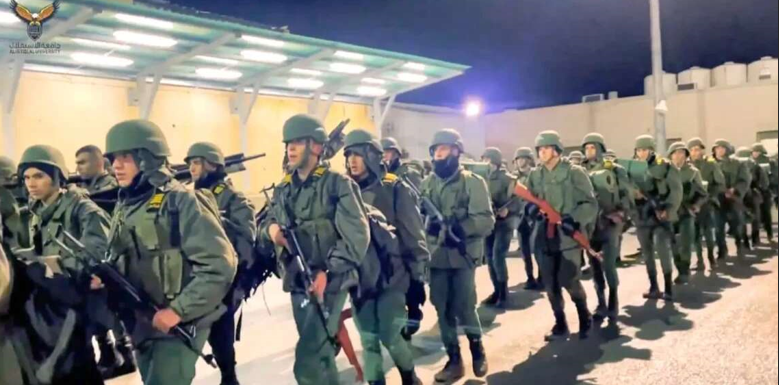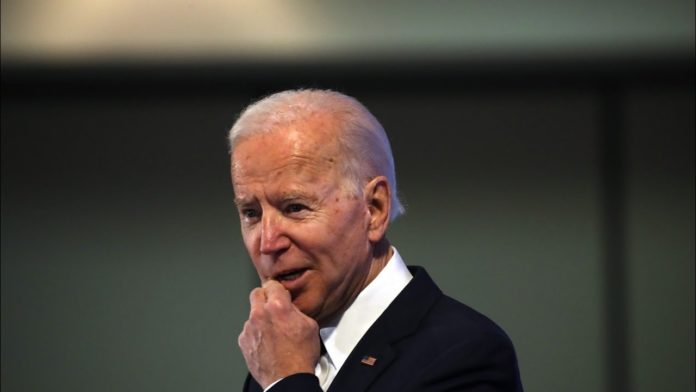The details of the overall situation in Judea & Samaria – Israel’s current “third front” – ostensibly appear to be rather mundane and routine. Another late-night arrest, another targeting operation, more shooting attacks on the roads, but only after you put all the small pieces of this large puzzle together do you get to see the terrible danger, the initial signs of which are just now coming to light.
Follow Israel Hayom on Facebook, Twitter, and Instagram
This is not “merely” a case of more mass demonstrations in support of the October 7 massacre on the outskirts of Ramallah, Nablus, or Tulkarm. This is not “merely” another case of declarations praising the October 7 massacre in the Gaza belt communities, made by senior Fatah officials, and let’s not forget that this is a movement headed by Mahmoud Abbas the Chairman of the Palestinian Authority (PA), and an attempt to stir up feelings towards a potentially similar horrendous act of violence against the Jewish settlements in Judea & Samaria or in those communities along its borders.
What is currently evolving before our very eyes should be a clear signal to all and sundry that the “Oslo approach”‘ of perpetuating the PA, which both Prime Minister Benjamin Netanyahu and the defense establishment still adhere to, is on the verge of collapsing. The scenario of the PASF (Palestinian Authority Security Forces) “turning their guns” and aiming them at the IDF forces, and/or the settlements in Judea & Samaria and those that border the Green Line, is rapidly developing into actuality. The warning signs are too numerous for us to ignore.
Dozens of terrorist attacks, attempted attacks, and shooting incidents at IDF forces, or the civilian population in Judea & Samaria, have been carried out since the beginning of 2023 by Palestinian policemen, members of the Preventive Security Forces, and members of other PASF units. A similar picture arises in relation to counter-terrorist activity too. Alongside the large number of successful targeting operations carried out by the IDF and the Shin Bet security agency against Hamas and PIJ members, over the course of the last year, dozens of Fatah men have also been killed. This has mainly involved Fatah’s al-Aqsa Martyrs’ Brigades, which since 2021 have taken up arms once again, and prior to the October 7 massacre in the Gaza belt communities, made an express appeal to their men, “What are you waiting for? Now is the time to kill the Jews…”
Since IDF Operation Guardian of the Walls, more than 100 PASF members have been killed, during attempts by them to carry out terrorist attacks, mainly led by the al-Aqsa Martyrs’ Brigades. These figures are often in contact with the Fatah faction secretaries in their specific areas; those same people whose declarations in support of the October 7 massacre and their express desire for a similar slaughter to be conducted in their own sector, Judea and Samaria, have been scorching Palestinian social media over the last two months.
The set of facts that shall be presented here is something that the PA is quite happy to highlight but is actually (relatively) kept hidden by Israel, which still regards the PA and its security forces as a partner. The intentional obscurity on the part of Israel emerges from the announcements issued by the defense establishment regarding arrests (or targeting operations). These announcements generally report only the overall number of arrests and state how many of them are affiliated with Hamas. About a week ago, for example, it was reported that since the outbreak of the current war, some 2,200 people had been arrested in Judea & Samaria, with 1,100 of them being Hamas-affiliated men. No information was made available to the public regarding the organizational affiliation of the other 50 percent, and you really need to dive deep into the reports, mainly on the Palestinian side, to understand that alongside members of the PIJ and “unidentified individuals”, many of them belong to organizations affiliated with Fatah, the beating heart of the PA, or its security forces; those very people whom the US aspires to integrate, once the war is over, in the overall solution to the situation both in Gaza and in the West Bank.
“Not even one dime”
The blurring of this information in the official announcements of the defense establishment is no accident. It is designed to preserve what remains (and yes it does remain!) of the security cooperation with the PASF in order to counter terrorist attacks. It is designed to prevent, as far as possible, copycat attacks being carried out by additional members of the PASF. However, at the same time, the information on the part played by members of the PASF and Fatah in acts of terrorism against Israel is covered up to a large extent.
In the PA announcements, in contrast, not only is there no attempt to conceal what is currently unfolding in front of our very eyes, on the contrary, the opposite is the case. Only a few months prior to the October 7 massacre in the Gaza belt communities, Fatah published a collage of photos of 24 terrorists, or ‘shahids’ (martyrs) as it prefers to call them, many of whom are members of the PASF, who were killed in clashes with Israel. The publication, which was exposed by Palestinian Media Watch, was last published on November 14, and the slogan “We are proud of you” boldly topped these photos. It was disseminated throughout the “West Bank” as part of the open competition with Hamas as to who leads the struggle against Israel.
The families of those 24 PASF members are now entitled, along with the thousands of terrorists from Hamas and the other terrorist organizations, some of which are affiliated with Fatah, to considerable terrorist stipends, amounting to thousands of shekels a month. Mahmoud Abbas himself has already made it quite clear that “Even if the PA is left with only one dime, it will give it, first and foremost, to the relatives of the shahids and the prisoners,” and that it will never cease to pay them their wages.
Over the last two months, just like Hamas terrorists, Fatah and PA members killed in terrorist attacks or Israeli counter-terrorism activity, have also been awarded mourning notices and official military funerals on behalf of the PA, and on a number of occasions, these events have been attended by senior PA officials, who have even delivered addresses and eulogies there. Muhammad Abad, for example, an officer in the PASF who was killed in Jenin alongside additional terrorists who were planning to perpetrate an attack on one of the settlements in Samaria, was given an official ceremony and a mourning notice.
The actual connection between the PASF and the Fatah al-Aqsa Martyrs’ Brigades has been clearly illustrated on a number of occasions over the past few weeks. The head of the Brigades in Tulkarm, Jihad Shuhada, who was recently killed, is documented in photos alongside his colleagues in the local PASF, holding an M-16 assault rifle. Some of the terrorists who have been acting against the IDF have relatives in the PASF, and neither has it been unusual to see the sons of senior PASF officials turning out to be terrorists. Thus, for example Na’if Rajub, a senior Hamas figure in the town of Dura, is the brother of Jibril Rajub, the former head of the PA Preventive Security Forces in the West Bank, who expressed support for the October 7 massacre in the Gaza belt communities and promised “an even more violent explosion in the West Bank.”
Though we do not have access to the data concerning the internal Palestinian organizational breakdown of the 1,600 ‘hot’ terrorist incidents (shooting and explosive devices) and the 4,000 incidents involving stone-throwing or Molotov cocktails that have occurred across Judea and Samaria in 2023, there is a fairly long list of terrorist incidents throughout the last year, in which terrorists from Fatah and its numerous splinter groups have taken part, alongside both Hamas and the PIJ.
The joint battalions
Meir Tamari from Hermesh was murdered last May by Fatah terrorists, as was the preschool teacher, Sheva Nagari, on Route 60 near Hebron, last August. A Palestinian policeman named Ala’a Qawato from the Tulkarm refugee camp was the person who planned to assassinate the Head of the Samaria Regional Council, Yossi Dagan, while Abdul Fatah Harusha, the murderer of the Yaniv brothers, Hallel and Yagel, in Huwara, served in the PA Internal Security Forces, while simultaneously acting as a Hamas terrorist. These are just a few select examples.
The list is much, much longer. Many of the terrorists who have murdered and wounded IDF soldiers and civilians over the past two years have been Fatah men and members of the PASF. This also applies to many on the list of those terrorists targeted by the IDF. It was published only recently, thought it did not make the main headlines, that the Fatah al-Aqsa Martyrs’ Brigades in the Hebron area, a Hamas city par excellence, threatened Mahmoud Abbas that if he did not enter the war against Israel, they would initiate a military uprising against him.
If we go back in time to the period prior to Operation Guardian of the Walls, we can find more examples of the involvement of PASF men in terrorist attacks, but following Operation Guardian of the Walls this has become a much more common occurrence, and all the more so during 2023.
Only two weeks ago, senior Fatah figure, Tawfik Tirawi, shrugged off claims that Fatah is not involved in the fighting, and even stated (in an interview to the Palestinian channel Al-Sharq) that Fatah is involved in the fighting alongside Gaza, it has adopted terrorist groups in the refugee camps and the cities, such as Nablus and Jenin, in which joint battalions of all the factions are operating together. Tirawi, the former head of the Palestinian Authority General Intelligence Service, claimed that various organizations are coordinated with each other, and that “Fatah has never ceded the use of the gun and the armed struggle, and shall always be at the forefront of the struggle.”
The dying embers
The possibility that this collection of sporadic terrorist incidents will develop into an organized tsunami and that the PA will turn its guns on Israel (as happened in the events of the Western Wall Tunnels back in 1996, and during the Second Intifada in the early 2000s), is currently an issue preoccupying many different officials and organizations in Israel.
Just a few days ago, for example, staff from the State Comptroller’s Office conducted a tour of Samaria. The Head of the Samaria Regional Council, Yossi Dagan, reminds us that the PA does not bother to conceal its support for the murder of Jews; or that the PA’s most senior officials have yet to condemn the October 7 massacre, and some of them have even praised it and encouraged similar acts of violence. “You simply need to listen to them and not to ignore what is happening on the ground,” says Dagan, “We know that in some cases Palestinian Authority officials use their licensed weapons during the day in their official roles, while at night, they swap these for illicit guns, to be used in terrorist attacks. “The IDF,” he states, “is engaged in an all-out effort to carry out raids on terrorist nests and against terrorists, but it must also be prepared for the scenario of the PASF turning its guns against us. Continuing to relate to the PA today as a partner is a terrible mistake.”
Major General (res.) Uzi Dayan, a former Deputy Chief of Staff and Head of the National Security Council recommends that the defense establishment should take immediate steps to prepare for a scenario of the PA turning its guns against us, “Whether this takes the form of only a partial, localized effort or on a full scale. Our problematic relationship with the PA,” he estimates, “will be put to the test the moment that the PA’s elderly leader, Mahmoud Abbas, who is currently living on his dying embers, disappears from the scene.”
Dayan believes that Israel must already begin to prepare for a military effort to take control of Area A, where the PA exercises full civilian and security control. “Though this might sound rather extreme, there really is no other correct solution for the dangers that we face and those that are already beginning to take form on the ground. Judea, Samaria, and the Jordan Valley, where the time has come for us to exercise our sovereignty, will all eventually become extensive Areas B and C. This is the situation we should strive to reach in the Gaza Strip too. The Palestinians will have only municipal and civilian powers there. No security powers.”
In Judea & Samaria, Dayan believes, “we have sufficient control of the territory, but the rest of the statistics are worse than the situation that existed in the Gaza belt communities. There are tens of thousands of Palestinians who carry arms, and the potential of them carrying out a raid on some or other settlement exists at any given moment…”
Q: Is there intelligence to indicate that the scenario of the PA turning its guns on us is about to happen?
“I don’t know, but the gauge with which we need to be working right now – and this is what I have always believed – is not necessarily that which measures the intentions of the other side or one that attempts to enter the enemy’s mind, but one that measures the other side’s capabilities. In the Gulf War,” Dayan recalls, “there was a General Staff meeting in which the question was posed, will the Iraqis fire at us? Everybody thought that the answer was no, and they even explained quite logically why not. I said that they would fire at us. They asked me why. I said: ‘Because they can, and when they do fire, you too will reach the same conclusion: they fired because they were able to.’ And this is precisely what happened.”
Q: And what is the analogy?
“That we must base our preparations not in accordance with our enemies’ intentions, but their capabilities, and since the scenario of the PA turning its guns against us is by no means far-fetched, and the Palestinians in Judea & Samaria have the capability coupled with an orderly ideology of hostility and hatred towards us, then we really need to prepare in accordance with their capabilities, according to the potential danger, and to derive the scenarios from this, which are also supported by their intentions.”
Q: The IDF will tell you that there is intelligence cooperation with the PA. That they help us to thwart terrorist attacks…
“That’s right, but it is not perceived there as an all-out war on terrorism. They don’t carry out the counter-terrorist operations with any special talent or quality, nor do they do this with any real desire, see for example the situation in Jenin and other locations too. Even now, we can no longer rely on them alone, and in the future, I’m not sure we will be able to rely on them at all.”
Dayan is concerned both about the fact that many of the terrorists and those targeted are from Fatah and also about the statements made by senior Fatah officials concerning the October 7 attack, and about similar events that might occur in the future. “In the events surrounding the opening of the Western Wall Tunnels in 1996, it was the masses who led the way, but then Palestinian policemen got involved and they shot at the IDF. This time there is an additional danger – that of attacks on Israeli settlements.”
Q: How should we prepare for this?
“First and foremost, we really need to understand and define the fact that we are currently in the middle of a war. The rapid response squads in the settlements are not sufficient. The army must work in parallel to create an offensive capability to take control of Area A territories, from where terrorist attacks might be launched. We also need to develop an active defensive capability to protect the settlements themselves.”
Q: What do you mean by an active defensive capability?
“A number of things: the rapid response squads must be turned into rapid response platoons and they need to be equipped accordingly, mainly in the larger settlements, in accordance with the IDF standard, and we must put an end to all the squabbling and disputes with them. We need to provide them with grenades, belt-fed machine guns, simple shoulder-launched missiles, and to grant recognition for their training routine. They need to take part in a serious training schedule. The next step would be to create the ability for IDF forces to join up with them, in each settlement, and where this is not possible – to create a capability for neighboring settlements to join forces and help each other our during times of difficulty. It is also important to drill such rendezvous capabilities, and the army must be ready to act not only inside the settlements but also against the source of any attack against the Jewish population in Judea and Samaria.”
Q: Why in your assessment do the IDF and the security forces currently obscure or even conceal the fact that Fatah and PASF personnel have been involved in terrorist attacks and shootings?
“We have two clear future clashes to contend with. One is with our best ally, the US, due to its perception of a two-state solution, and what it refers to as a ‘revitalized’ Palestinian Authority headed by someone who will be ready to openly speak about peace and reconciliation, and the other one with the Palestinian Authority itself, or what remains of it. The current ambiguity and obscurity result from an obvious desire and interest to push off those clashes rather than bring them forward.”
The Dayton battalions
In recent weeks, clips have been posted on social media showing the exercises conducted by the PASF battalions. Watching them is no walk in the park. In these clips, the battalions appear to act as an army training for an armed conflict or war. The exercises are extremely similar to those of the IDF, on occasions even aspiring to resemble training carried out by some of the IDF’s crack units.
The battalion exercises include a ‘war week’, a company-level exercise, and a ruck march of tens of kilometers in northern Samaria, as well as MOUT (military operations in urbanized terrain), exercises to conquer installations, etc. It is not wholly clear what the connection is between the definition of a “strong police force” tasked with guaranteeing “public order and internal security” (according to the original wording in the Oslo accords relating to the establishment of the PA), and these forces that form part of the 45-thousand strong PASF run by the Palestinian Authority.
These battalions were set up years ago, following the Second Intifada, by US General Keith Dayton. The central training facility of these battalions is located at the military academy in Jericho but they have also trained in Jordan under US supervision, and in the past, both British and Italian instructors took part in their training.
All this is occurring against the backdrop of the October 7 massacre in the Gaza belt communities, and at the same time, in the last two months, based on AI, clips have been made and posted on social media, to simulate raids on settlements in Judea & Samaria. These clips are designed to encourage the local Palestinian population in Judea & Samaria to destroy the fences of the Jewish settlements and the to infiltrate them. If we add to this the renewed involvement of certain parts of Fatah and its affiliate organizations in terrorism, along with its support for Gaza and Hamas’ actions, as clearly emerges from the numerous street processions and demonstrations, then we are faced with an extremely worrying situation.
The multiple declarations of senior Fatah figures regarding the October 7 massacre are also far from being reassuring, on the contrary. Moayad Sha’aban, PA minister and head of the Colonization and Wall Resistance Commission, attended the funeral of the terrorists who were killed during the battle in the Nur Shams refugee camp in Tulkarm, in which a Border Police soldier, Maxim Reznikov, was killed. Twelve terrorists were killed during that incident, including an officer in the PASF who took part in the shooting at the Israeli soldiers. Abbas Zaki, a member of the Fatah Central Committee, thanked Hamas for carrying out the October 7 attack and threatened to smash the skulls of all the Jews and the Americans in the region. Abdul Rahman Abu al-Rab, a Fatah member from Jenin, defined the October 7 massacre as a morning of joy, victory, and pride, praising the “heroic shahids in Gaza.” Jamal Hawil, a member of the Fatah Committee on the PA, promised a great surprise in Judea & Samaria too, expressing his hope that the images emerging from Gaza would also be seen in the West Bank too. Tirawi and Jibril Rajub, whom we have already mentioned, also added their own fuel to the fire, while the infamous Marwan Barghouti, one of the key leaders of the Second Intifada, now serving five consecutive life sentences for murder, this week called on his movement, Fatah, from his prison cell, to organize general resistance “across all the Palestinian lands.”
The Diplomatic-Security Cabinet has for the time being refrained from taking an in-depth look into the danger of the PA turning its guns against us. Even the general overview presented above, which is relatively detailed, has not been presented to the cabinet ministers. This became apparent last week in the answer to the question of the Minister of Settlements and National Missions, Orit Struck, at a meeting of the Socio-economic Cabinet, discussing the issue of allowing workers from Judea and Samaria to enter Israel. During the meeting, Struck warned of a scenario in which in a matter of only a few minutes a lethal incident develops, and even mentioned the names of settlements that are more susceptible to such a scenario. She even proposed stationing tanks in some of these locations. In the discussion held this week at the Knesset Foreign Affairs and Defense Committee, Prime Minister Netanyahu tried to calm things down and said that in a situation in which the PASF openly turn against Israel, “within a few minutes IAF helicopters will be in the air in order to provide an appropriate response.”
“HaTzofot” Forum issues a stern warning
And in the meantime, there is considerable growing concern among the Jewish settlements. About a month ago, the wives of currently serving reservists from Teqo’a, Binyamin and Samaria established the “HaTzofot” (Female Scouts) forum, whose name, apparently not by chance, is reminiscent of the story of the female IDF lookouts on the Gaza border on the eve of the current war. The women from HaTzofot are also asking that people should listen to them and take their warnings seriously. The catalyst for founding the organization were the recent olive harvest incidents, during which Palestinians approached the settlement fences, on a number of occasions in an extremely threatening manner, including many individuals who had not even come to take part in the olive harvest.
Hadas Madmon from Migdalim, one of the founders of HaTzofot, says that following the olive harvest incidents the penny dropped: “The approach to security here has not changed following October 7. Initially, there was a sense of the “boss has gone mad”, but it soon elapsed and once again the Palestinians went back to blinding us on the roads with lasers, playing games with us, and testing the limits. Last Thursday, they already shot from a passing car on the road beneath the settlement.
“We are definitely concerned that here too, we might have to face a similar event to the horrendous attack that took place in the Gaza belt communities,” she says, “For 30 years we nurtured the monster from Oslo and provided them with arms. Some of the recently released terrorists have gone back to their villages next door to us. This is a danger that haunts Kfar Saba, Rosh Ha’Ayin, and similar towns and cities along the Green Line.”
Two weeks ago, the women from HaTzofot met with the Head of the IDF Central Command, Major General Yehuda Fuchs. “He was very attentive and respectful,” Madmon recounts, “but, he also made it clear to us that he implements government policy, and the current policy is that the PA is our partner. The governance is critical everywhere, but especially among those who are more exposed to threats, as we are.”
Is the scenario of the PA turning its guns against us indeed a not-too-distant reality? In part? In full? Against settlements? Against the IDF? The multitude of indications and warnings, or I&W, to use the professional military jargon, that we have brought here should be sufficient to set a huge red light flashing in front of the policymakers at both the military and political level, which are currently preoccupied with the two main fronts in the north and the south, and do not have the time to engage in a profound debate regarding this third, and no-less menacing, front.













